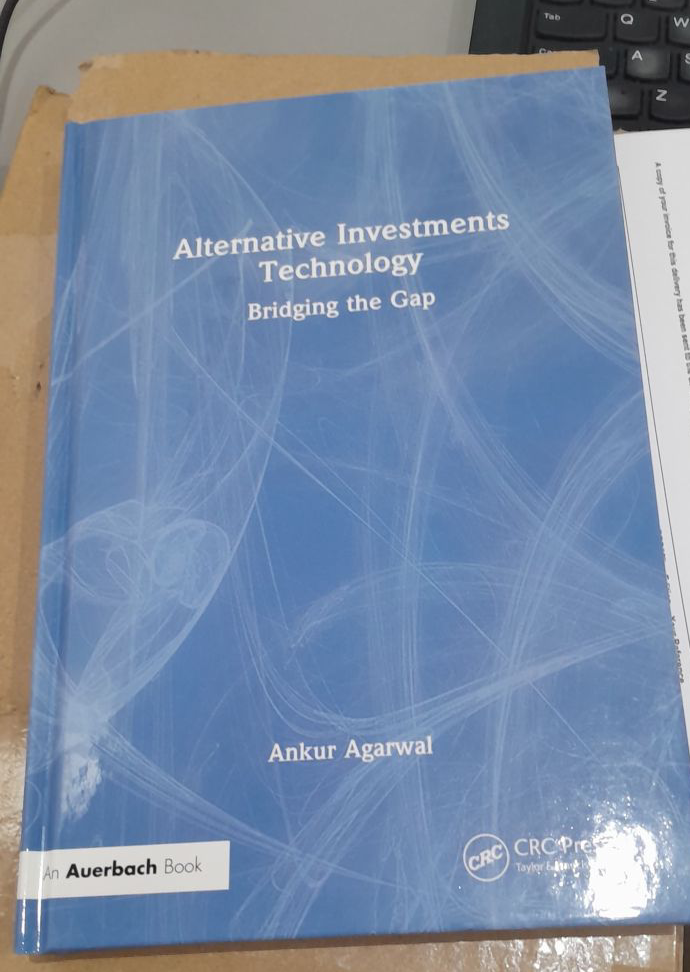advertisement
Book Review: Alternative Investments Technology: Bridging The Gap By Ankur Agarwal

As Africa’s alternative investment landscape expands, so does the urgency for fund managers, CIOs, and institutional investors to adopt modern technologies that enable scale, compliance, efficiency, and transparency. In Alternative Investments Technology: Bridging the Gap, author Ankur Agarwal offers a timely and insightful guide for professionals operating at the intersection of finance and technology. The book does not attempt to teach readers the fundamentals of alternative investments; instead, it seeks to guide those who want to put into practice the multi-faceted changes brought by technology on the industry.
Ankur Agarwal, the Co-Founder and CTO of PE Front Office, brings over two decades of experience in designing, building, and implementing software solutions for the alternative investment sector. His firm, PE Front Office has served clients all over the world, from small family offices to big private capital firms, and these insights form the backbone of the book’s practical recommendations.
A Sector in Transformation — and Why Tech Matters
advertisement
Alternative investments — including private equity, venture capital, private debt, real assets, and hedge funds — have seen significant global growth. In Africa, despite certain structural challenges, the market is evolving fast. According to AVCA (African Private Capital Association), private capital investments in Africa was $3.6 billion across 487 deals in 2024, with strong activity in West, East, and Southern Africa. Technology is increasingly seen as a key enabler to manage this growth and bring institutional-grade processes to firms operating in emerging markets.
Agarwal’s book speaks directly to this need. He demystifies core concepts and outlines how firms must rethink their operating models and modernize their processes to remain competitive. He stresses the need for agility, not only in strategy but in systems design — making the case for modular, scalable technology infrastructures that can evolve with the firm’s needs.
Africa in Focus: Kenya, Nigeria, and South Africa
advertisement
While the book takes a global perspective, its core themes resonate deeply within Africa’s emerging private capital hubs:
- Kenya: Known as “Silicon Savannah,” Nairobi has quickly emerged as a major East African hub for venture capital. Startup activity increased across the nation, especially in the fintech, agri-tech, and health-tech sectors. Nonetheless, many Kenyan VC and PE firms continue to use manual procedures, spreadsheets, and disjointed systems. Here, Agarwal’s focus on automation, system integration, and investor transparency is very relevant. Using professional-grade technology will be essential as Kenyan fund managers grow and look for international LPs.
- Nigeria: Growing private capital flows and a vibrant entrepreneurial environment can be found in Nigeria and it was the most active country in Africa in terms of deal volume. But there are still issues like inconsistent data, a lack of reporting tools, and unclear regulations. A useful road map is provided by the book’s discussion of centralised data systems, AI-based risk flagging, and digital compliance workflows for Nigerian firms seeking operational robustness and LP-grade reporting.
- South Africa: South Africa has the most mature alternative investment ecosystem on the continent, with institutional investors playing a significant role. The country is also home to several private capital associations and frameworks for ESG and impact investing. An organised perspective on how businesses can transition from legacy systems to agile, cloud-based platforms is provided by Agarwal’s book. For South African GPs navigating international sustainability standards, his talk on ESG integration and impact measurement using digital tools is especially pertinent.
Practical Guidance for Real-World Dilemmas
A standout strength of this book lies in its practical treatment of the real-world dilemmas that alternative investment firms face as they adopt technology. Rather than offering abstract theory, Agarwal zooms in on the key decision points that CIOs, CTOs, and fund managers must navigate.
advertisement
Should you automate a particular process or keep it manual? Is a unified platform better than a set of best-of-breed tools? How do you select the right technology partner in a crowded, fragmented market? What kind of infrastructure — cloud, on-prem, or hybrid — best suits your firm’s scale and regulatory environment?
The book addresses these questions systematically, offering readers a clear framework for aligning technology choices with their firm’s strategy, size, and investment mandate. Importantly, it also highlights common pitfalls: underestimating change management, failing to involve key stakeholders, and not planning for scale early enough.
Relevance to CIOs and Tech Leaders
What sets Alternative Investments Technology: Bridging the Gap apart is its pragmatic approach. Agarwal doesn’t just describe problems — he offers solutions. Through real-world case studies, best practices, and a strategic roadmap, the book provides both vision and execution guidance. For CIOs, CTOs, and operations heads in African investment firms, the book offers a roadmap to drive digitization without disruption. It encourages proactive planning, cross-functional collaboration, and alignment of technology strategy with fund objectives.
Importantly, it provides context for making trade-offs — speed vs. control, cost vs. scalability, compliance vs. agility — that every tech leader in private capital must contend with.
Final Thoughts: A Critical Read for Africa’s Investment Leaders
Africa’s alternative investment market is evolving rapidly, but it’s also reaching a point where scale without systems could become a bottleneck. Technology will be the defining factor that separates firms that thrive from those that stagnate.
Alternative Investments Technology: Bridging the Gap is a must-read for anyone serious about modernizing private capital operations — whether you’re a GP managing a pan-African impact fund, a VC scaling across markets, or a CIO tasked with future-proofing your firm’s technology.
By highlighting the “how” of technology adoption, not just the “why,” Ankur Agarwal has made a valuable contribution to the private capital community — one that will resonate strongly across Kenya, Nigeria, South Africa, and beyond.